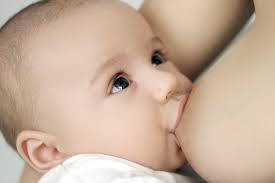Despite the benefits of breastfeeding, 1 in 5 babies in high-income countries are not breastfed at all, compared to just 1 in 25 in low- and-middle-income countries
The number of babies missing out on breastfeeding remains high, particularly among the world’s richest countries, UNICEF said in a new analysis released on 10 May 2018. Worldwide, approximately 7.6 million babies each year are not breastfed.
The analysis indicates that even though breastmilk saves lives, protects babies and mothers against deadly diseases, and leads to better IQ and educational outcomes, an estimated 22 per cent of babies in high-income countries are never breastfed. In low-and-middle-income countries, the rate is 4 per cent.
“Breastfeeding is the best gift a mother, rich or poor, can give her child, as well as herself,” said Shahida Azfar, UNICEF’s Deputy Executive Director a.i. “As we celebrate Mother’s Day, we must give the world’s mothers the support they need to breastfeed.”
Almost all Zimbabwean children (98 percent), have been breastfed at some point in their life with almost two thirds (58 percent) initiating breastfeeding within one hour of birth. Forty-eight percent of infants under age 6 months are exclusively breastfed. The median duration of any breastfeeding is 17.3 months, while the median duration for exclusive breastfeeding is 2.3 months.
However, within low-and-middle-income countries, wealth disparities affect how long a mother will continue to breastfeed her child, the data show. Babies from the poorest families have rates for breastfeeding at 2 years that are 1.5 times higher than those from the richest families. The gaps are widest in West and Central Africa and in Latin America and the Caribbean, where babies from the poorest families have breastfeeding rates at 2 years that are nearly double those from wealthier families.
“We know that wealthy mothers in poor countries are less likely to breastfeed, but somewhat paradoxically, we’re seeing indications that in wealthy countries, it’s the poor who are the least likely,” said Shahida Azfar, UNICEF’s Deputy Executive Director a.i.” These breastfeeding gaps across income levels are a strong indication that countries, regardless of the level of wealth, are not informing and empowering every mother to breastfeed her baby.”
Early breastfeeding practices ensure the successful establishment and duration of breastfeeding up to two years and beyond. Successful breastfeeding is particularly critical in settings like Zimbabwe where the quality and quantity of complementary feeding is not optimal for most children. The 2018 national nutrition survey reported that only 4% of children aged 6 to 23 months were fed a minimum acceptable diet. The minimum meal frequency was at 19% and minimum dietary diversity at 16% (NNS, 2018).
For Zimbabwe to continue to support, promote and protect breastfeeding and preserve children’s lives, there is need to scale-up efforts towards creating more baby friendly hospitals and communities. Seventeen hospitals have recently been certified baby friendly (within the past 3 years). There is also need to create baby friendly workplaces that support working mothers to either bring babies to work or have a comfortable place to express and safely keep breastmilk during the day.
Through its global campaign, Every Child ALIVE, which demands solutions on behalf of the world’s newborns, UNICEF urges governments, the private sector and civil society to:
- Increase funding and awareness to raise breastfeeding rates from birth through the age of two.
- Put in place strong legal measures to regulate the marketing of infant formula and other breastmilk substitutes as well as bottles and teats.
- Enact paid family leave and put in place workplace breastfeeding policies, including paid breastfeeding breaks.
- Implement the ten steps to successful breastfeeding in maternity facilities, and provide breastmilk for sick newborns.
- Ensure that mothers receive skilled breastfeeding counselling at health facilities and in the first week after delivery.
- Strengthen links between health facilities and communities, so that mothers are ensured of continued support for breastfeeding.
- Improve monitoring systems to track improvements in breastfeeding policies, programmes and practices.
On Mother’s Day, recognised in May in over 128 countries, Every Child ALIVE is celebrating mothers and babies and their right to be supported through pregnancy, delivery and birth.






